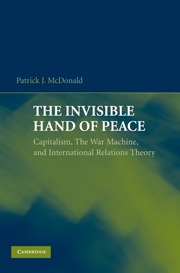Book contents
- Frontmatter
- Contents
- List of Tables
- Acknowledgments
- 1 American Grand Strategy and the Liberal Peace
- 2 Liberal International Relations Theory on War
- 3 Releasing the Invisible Hand
- 4 Liberal Economic Institutions and Peace in the Twentieth Century
- 5 Free Trade and Peace in the First Era of Globalization
- 6 From Rivalry to Friendship
- 7 The Achilles' Heel of Liberal International Relations Theory?
- 8 Peace Across the Taiwan Strait?
- 9 The Invisible Hand or the Ballot Box?
- 10 Capitalism and America's Peaceful Market Power
- References
- Index
9 - The Invisible Hand or the Ballot Box?
Published online by Cambridge University Press: 05 June 2012
- Frontmatter
- Contents
- List of Tables
- Acknowledgments
- 1 American Grand Strategy and the Liberal Peace
- 2 Liberal International Relations Theory on War
- 3 Releasing the Invisible Hand
- 4 Liberal Economic Institutions and Peace in the Twentieth Century
- 5 Free Trade and Peace in the First Era of Globalization
- 6 From Rivalry to Friendship
- 7 The Achilles' Heel of Liberal International Relations Theory?
- 8 Peace Across the Taiwan Strait?
- 9 The Invisible Hand or the Ballot Box?
- 10 Capitalism and America's Peaceful Market Power
- References
- Index
Summary
If “capitalism” means here a competitive system based on free disposal over private property, it is far more important to realize that only within this system is democracy possible. When it becomes dominated by a collectivist creed, democracy will inevitably destroy itself.
– F. A. Hayek, The Road to SerfdomHayek's observation sets up an important question for international relations theory and contemporary debates over American grand strategy. A wide range of liberal thought and contemporary research claims that the emergence of democratic institutions depends on the presence of such factors as a robust middle class, economic development, market-based exchange, and international institutions that expose domestic economic actors to global competition. All of these possibilities suggest that democracy may be rooted in the emergence of capitalism. If this is true, then the tendency for democratic states to avoid military conflict with each other may be caused not by electoral restraints, but by competitive markets and the predominance of private ownership instead.
On top of the theoretical implications posed by the possibility that the democratic peace is nested in a larger capitalist peace, the relative role of markets versus elections in constraining war also carries important implications for contemporary American grand strategy. The United States has a long history of promoting democracy abroad to facilitate its foreign-policy goals, including peace in the international system.
- Type
- Chapter
- Information
- The Invisible Hand of PeaceCapitalism, the War Machine, and International Relations Theory, pp. 264 - 283Publisher: Cambridge University PressPrint publication year: 2009

